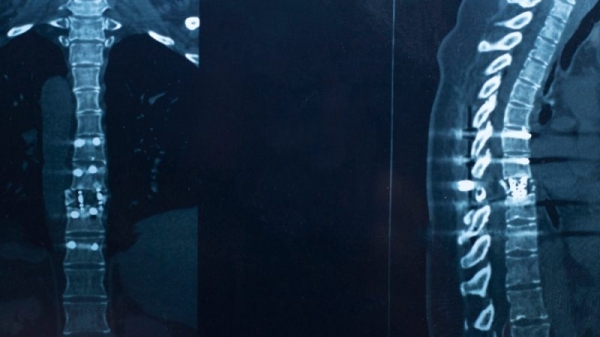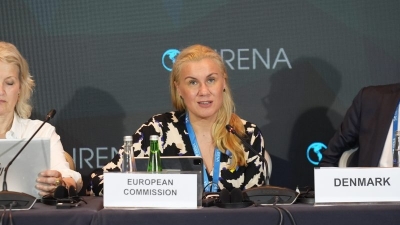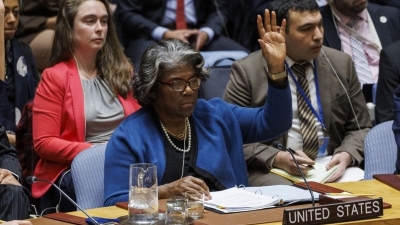Innovative therapies bring hope for German myeloma patients

Almost 7,000 Germans come down with multiple myeloma, an aggressive form of bone-marrow cancer, every year, but while mortality rates remain high, research is progressing, giving hope to patients.
While the cancer can often go undetected without major symptoms for a significant amount of time, once symptoms break out, they can significantly disrupt patients’ life.
According to the Berlin Institute of Health, multiple myeloma can cause a weakened immune system, kidney failure, and significant bone loss that can lead to fractures.
“I despaired more and more because I was in permanent pain,” one German patient, who reported severe back pain as the symptom that led to the diagnosis, recalled on a cancer patients’ podcast. “Every day, it grew worse,” she added.
In many cases, the cancer is seen as incurable and mortality rates remain high.
Only 54% of women and 56% of men with multiple myeloma survive after five years. After ten years, the survival rate is down to 37% for women and 39% for men, according to the Robert Koch Centre, Germany’s federal health agency.
This is because, even if the cancer is held at bay for several years through therapies, it can become resistant to the medication and eventually grow again.
Still, much progress has been made over recent years and decades, especially regarding patients’ life expectancy.
Twenty years ago, “many patients died of the disease within two or three years,” Udo Holtick from Cologne University explained in a recent publication. Nowadays, he added, it is not unusual for those affected to live for another ten years.
Promising approaches
More improvements could be around the corner as several recent studies show signs of hope for patients. “This is why, over the next years, we can expect a further substantial improvement in the prognosis of myeloma patients,” Holtick added.
One such example is a recent therapy approach called CAR T cell therapy.
Traditionally, multiple myeloma is usually treated through a combination of chemotherapy and stem cell transplants.
CAR T therapy uses genetically modified immune cells to treat cancer in a different way The gene manipulation enables immune cells to better detect and destroy malicious cells in patients’ blood, bone marrow, and lymph nodes.
“In many respects, this is a milestone,” Max Topp, head of the CAR T cell programme at the University Hospital of Würzburg in southern Germany, stressed.
In early March, the clinic treated the 100th patient with CAR T after administering the therapy since 2016.
Progress has also been made regarding the combination of different treatments – an approach that is seen as especially promising to prevent cancer from becoming resistant to medication.
A recent clinical study conducted by a team of researchers from the German University of Heidelberg and published in Lancet Haematology found that the standard three-way medication mix used as a first treatment for the cancer can see a significantly higher rate of success if it is combined with a so-called monoclonal antibody.
“These are extremely encouraging results,” Hartmut Goldschmidt, who supervised the study, said.
Using the treatment, “we can significantly improve the starting conditions and thus also the chances of success for the following stem cell therapy in a considerable proportion of our patients,” he explained.

Multiple myeloma patients face late diagnosis, unequal access to therapies
Delayed diagnosis and inequalities in access to treatments across the EU are among the main challenges in fighting multiple myeloma, an incurable and rare form of blood cancer.
Funding is key
A key factor for whether research will continue to drive similar progress on myeloma treatments in the future is funding.
Due to its relatively low incidence rate, multiple myeloma is seen as a rare disease. This can bring barriers to funding unequal since incentives to invest in researching treatments are lower.
To tackle this problem, the German research ministry financially supports national research projects and cooperation with other researchers abroad. Under the programme “Research for rare,” a total of €21.5 million is earmarked for research into rare disease treatments.
Meanwhile, once it is developed, medication for rare diseases is also often costly due to the lower number of doses produced.
Contacted by EURACTIV, the German health insurers’ umbrella association (GKV) did not want to comment on whether the financial support myeloma patients currently received is sufficient. Instead, a spokesperson pointed to the responsibility of lawmakers.
“The granting of benefits is based on medical need,” she said. According to the German Social Code, “services must be sufficient, appropriate and economical, and they must not exceed what is necessary,” she added.

Revision of orphan and paediatric drug framework needed, say reports
Both the European Parliament and the World Health Organisation (WHO) have reiterated the need to update the regulations on medicines for children and orphan drugs, in order to better address unmet needs of children and adolescents in cancer care.
More on the same topic...




